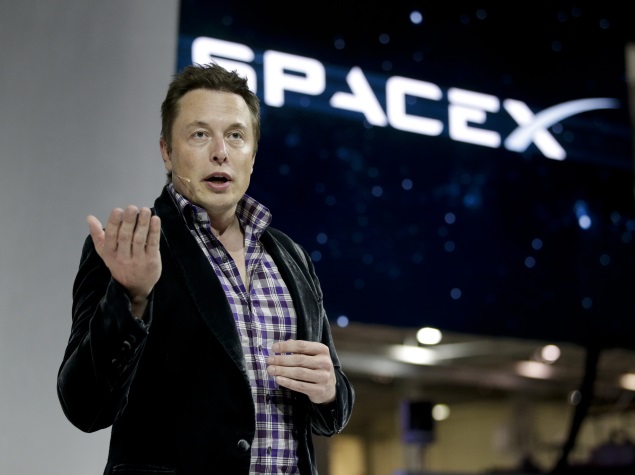- Home
- Science
- Science News
- SpaceX Falcon Rocket Lifts Off on Sunday With Communications Satellite
SpaceX Falcon Rocket Lifts Off on Sunday With Communications Satellite

The 224-foot (68-meter) tall rocket lifted off from its seaside launch pad at 1 a.m. EDT/0500 GMT, dashing through partly cloudy, nighttime skies as it headed toward space.
Tucked inside the rocket's nosecone was the second of two satellites owned by Hong Kong-based Asia Satellite Telecommunications Holdings Ltd, or AsiaSat.
The first satellite, AsiaSat 8, was successfully delivered into an orbit some 22,200 miles (35,700 km) above Earth on Aug. 5.
Both satellites were built by Space Systems/Loral, a Palo Alto, Calif.-based subsidiary of Canada's MacDonald Dettwiler and Associates Ltd.
"With the two satellites coming out of the factory approximately the same time we were able to book back-to-back missions," said AsiaSat chief executive William Wade. The two launches cost AsiaSat about $110 million, Wade said.
Privately owned SpaceX, as the company is known, planned to launch the second satellite, AsiaSat 6, two weeks ago, but delayed the flight to recheck the rocket's systems following an unrelated accident that claimed the company's prototype Falcon 9R reusable lander during a test flight on Aug. 22.
"We are confident there is no direct link," SpaceX founder and chief executive Elon Musk wrote in a statement after the calling off the launch.
The Falcon 9R, a modified three-engine Falcon rocket, self-destructed shortly after liftoff from SpaceX's McGregor, Texas, facility. Musk said the problem was due to a blocked sensor port, a situation that would not have impacted an operational Falcon rocket.
(Also see: SpaceX Launches Falcon Rocket With Commercial Satellite After Hitch)
"What we do want to triple-check is whether even highly improbable...scenarios have the optimal fault detection and recovery logic," Musk wrote.
SpaceX on Saturday declined to say if any equipment or procedures were changes as a result of the investigation.
Sunday's launch was the 12th flight of a Falcon 9 rocket, which in addition to delivering satellites for commercial companies flies Dragon cargo ships to the International Space Station for Nasa.
SpaceX is competing to build a passenger version of Dragon to fly astronauts as well and is attempting to break into the lucrative military satellite launch business.
The satellite launched on Sunday is outfitted with 28 high-power C-band transponders for video distribution and broadband network services in China and Southeast Asia.
Half of the transponders are reserved for Thaicom PLC, which owns the orbital slot AsiaSat 6 will use, Wade said.
The new satellite, which is designed to last 15 years, is the sixth member of AsiaSat's current orbital network, half of which were launched by Russian Proton rockets.
© Thomson Reuters 2014
For the latest tech news and reviews, follow Gadgets 360 on X, Facebook, WhatsApp, Threads and Google News. For the latest videos on gadgets and tech, subscribe to our YouTube channel. If you want to know everything about top influencers, follow our in-house Who'sThat360 on Instagram and YouTube.
Related Stories
- Galaxy S24 Series
- MWC 2024
- Apple Vision Pro
- Oneplus 12
- iPhone 14
- Apple iPhone 15
- OnePlus Nord CE 3 Lite 5G
- iPhone 13
- Xiaomi 14 Pro
- Oppo Find N3
- Tecno Spark Go (2023)
- Realme V30
- Best Phones Under 25000
- Samsung Galaxy S24 Series
- Cryptocurrency
- iQoo 12
- Samsung Galaxy S24 Ultra
- Giottus
- Samsung Galaxy Z Flip 5
- Apple 'Scary Fast'
- Housefull 5
- GoPro Hero 12 Black Review
- Invincible Season 2
- JioGlass
- HD Ready TV
- Laptop Under 50000
- Smartwatch Under 10000
- Latest Mobile Phones
- Compare Phones
- Huawei Pura 70 Pro+
- Huawei Pura 70 Ultra
- Tecno Camon 30 Premier 5G
- Motorola Edge 50 Fusion
- Oppo A1i
- Oppo A1s
- Motorola Edge 50 Ultra
- Leica Leitz Phone 3
- Asus ZenBook Duo 2024 (UX8406)
- Dell Inspiron 14 Plus
- Realme Pad 2 Wi-Fi
- Redmi Pad Pro
- Cult Shock X
- Fire-Boltt Oracle
- Samsung Samsung Neo QLED 8K Smart TV QN800D
- Samsung Neo QLED 4K Smart TV (QN90D)
- Sony PlayStation 5 Slim Digital Edition
- Sony PlayStation 5 Slim
- IFB 2 Ton 3 Star Inverter Split AC (CI2432C323G1)
- Daikin 1 Ton 3 Star Inverter Split AC (FTKL35UV16W+RKL35UV16W)

















